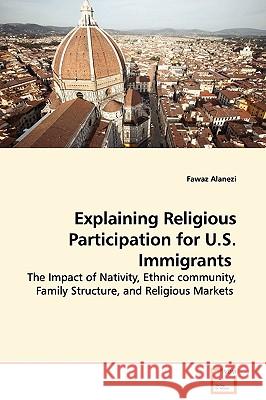Explaining Religious Participation for U.S. Immigrants » książka
Explaining Religious Participation for U.S. Immigrants
ISBN-13: 9783639091632 / Angielski / Miękka / 2008 / 164 str.
This book will test hypotheses relevant for ethnic community, social capital, and rational actor theories to explain religious participation among US immigrants. In this work, I provide an overview of the theoretical perspectives that will guide my research. Ethnic community and social capital theorists have suggested that religious organizations constitute important social capital resources that generate cultural and economic benefits. The size and location of the ethnic community may also play a significant role in religious participation among immigrants. Immigrant and ethnic communities can play a normative role by enforcing participation through possible sanctions and restricting access opportunities. Participation in such situations may become semi-involuntary. Immigrant religion may also be fruitfully explored using market theories from the demand and the supply side. These theories examine the preferences and constraints of individuals making religious choices, and also the structure of market offerings in the origin and destination nations that constitutes the religious supply.
This book will test hypotheses relevant for ethnic community, social capital, and rational actor theories to explain religious participation among US immigrants. In this work, I provide an overview of the theoretical perspectives that will guide my research. Ethnic community and social capital theorists have suggested that religious organizations constitute important social capital resources that generate cultural and economic benefits. The size and location of the ethnic community may also play a significant role in religious participation among immigrants. Immigrant and ethnic communities can play a normative role by enforcing participation through possible sanctions and restricting access opportunities. Participation in such situations may become semi-involuntary. Immigrant religion may also be fruitfully explored using market theories from the demand and the supply side. These theories examine the preferences and constraints of individuals making religious choices, and also the structure of market offerings in the origin and destination nations that constitutes the religious supply.











